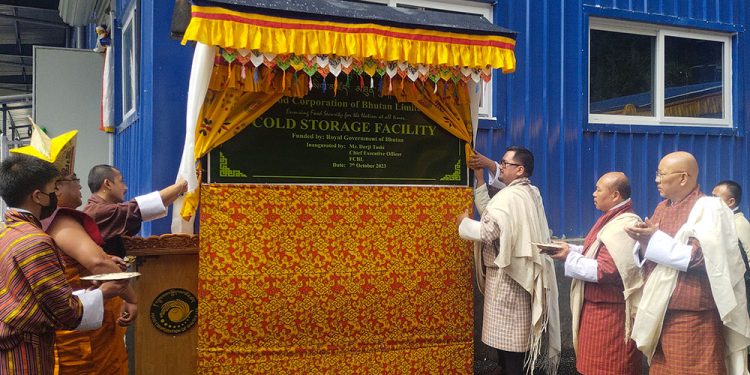#BhutaneseAgriculture #ColdStorageFacility #FarmersEmpowerment #AgriculturalInnovation #SustainableFarming #FoodSecurity #MarketAccess #RuralDevelopment #PostHarvestLosses #BhutaneseFarmers
In a groundbreaking move, the Food Corporation of Bhutan (FCB) has unveiled a state-of-the-art cold storage facility in Khaling, Trashigang, providing a lifeline for farmers in eastern Bhutan. With a capacity of 300 metric tonnes, this facility marks a significant shift for farmers who have long grappled with post-harvest losses. This article explores the impact of this initiative on local agriculture, shedding light on the hopes, challenges, and promising future it brings.
In recent years, Bhutanese farmers faced a daunting challenge: surplus vegetables and fruits often went to waste due to the absence of cold storage facilities. This meant significant losses for hardworking agriculturalists, leaving them with limited options to sustain their livelihoods.
However, the landscape changed with the inauguration of the cold storage facility in Khaling by the Food Corporation of Bhutan. With a substantial capacity of 300 metric tonnes, this facility not only addresses the issue of post-harvest losses but also opens avenues for farmers to explore better markets, both domestically and internationally.
The Impact on Farmers: A Ray of Hope Amid Challenges
Local farmers, once burdened by the prospect of wastage, now see a glimmer of hope. Tashi, a villager from Khaling, expressed his optimism, stating, “We could store perishable vegetables during the lean season instead of exporting the products, which would have to be imported again later. We could store and supply when the price is better.” This sentiment was echoed by Tshering Norbu, who highlighted the newfound ability to engage in commercial-scale vegetable and potato farming.
Overcoming Challenges and Building a Sustainable Future
While the introduction of the cold storage facility is undoubtedly a game-changer, challenges remain. Concerns about the affordability of the facility, with monthly costs ranging from Nu 4,000 to Nu 8,000, have been voiced by some farmers. However, Khaling Gup, Sonam Dorji, emphasized that the facility would support increased vegetable production, enabling farmers to command better prices for their produce.
Looking Ahead: A Vision for Bhutanese Agriculture
The CEO of FCB, Dorji Tashi, underlined the facility’s role in enhancing market access and formulating effective marketing strategies. He stated, “The cold storage facility is built as per the contingency plan to support hardworking farmers, businessmen, and entrepreneurs.” Additionally, plans are underway to implement online auctions, allowing farmers to sell their produce directly from Khaling.
This initiative is not just about storage; it symbolizes a transformative phase for Bhutanese agriculture. The construction of two more cold storage facilities in Pasakha and Zhemgang further underlines the government’s commitment to bolstering the agricultural sector.
A New Dawn for Bhutanese Farming
The inauguration of the cold storage facility in Khaling stands as a testament to Bhutan’s dedication to supporting its farmers. By addressing the crucial issue of post-harvest losses and providing access to better markets, this initiative paves the way for a more prosperous future for the nation’s agricultural community. As Bhutan moves forward, investing in innovative solutions like these not only strengthens the agricultural sector but also ensures food security and economic stability for generations to come.







